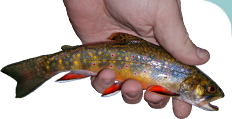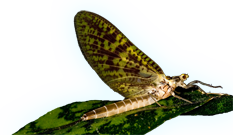Blog & Latest Updates
Fly Fishing Articles
Insects by Common Name


> > Wiggle Nymphs
| Martinlf | April 28th, 2007, 9:02 am | |
Moderator Palmyra PAPosts: 3233 | Could Gonzo, and others with experience tell us a little about where and how to fish jointed wiggle nymphs? I have some ideas, but fear they are incomplete at best. | |
| "He spread them a yard and a half. 'And every one that got away is this big.'" --Fred Chappell | ||
| GONZO | April 28th, 2007, 10:52 am | |
Site Editor "Bear Swamp," PAPosts: 1681 | Louis, Basically, wiggle nymphs have advantages in some aspects of imitation and attraction. Trout vision is highly attuned to movement, and this is the attraction aspect. From an imitation standpoint, some nymphs are strong swimmers, some swim in certain situations, and some wriggle as they crawl. Here are a few instances where I think wiggle nymphs have imitative advantages: 1. Swimming mayfly nymphs--large swimmers like Isonychia are very well-imitated by wiggle nymphs. Either a pulsing/twitching drift or a swimming retrieve can be effective. 2. Burrowing mayfly nymphs--burrowing nymphs like Hexagenia or Ephemera swim strongly to the surface to emerge. Drifting the fly into position in front of a feeding fish (or the suspected location of a feeding fish) and raising it quickly to the surface in a pulsing lift is very effective. 3. Crawling mayfly nymphs--crawlers like Ephemerella and Drunella tend to freeze when caught in a turbulent drift and also immediately before they emerge. However, they tend to wiggle in a pulsing movement whenever they are momentarily out of the turbulence and swim (sometimes awkwardly) toward the surface in the slower water. A drift that terminates with a twitching rise (lift) toward the surface is effective for those that emerge in slower water. 4. Large stonefly nymphs--large stoneflies of Perlidae or Pteronarcyidae are lousy swimmers and mostly thrash with their legs, or freeze/curl defensively in the current. However, an articulated nymph crawls/drifts very convincingly across the bottom, especially when slightly overweighted. The articulation helps overcome the stiff, lifeless appearance of such large imitations. These are just a few examples of how articulation can add attractive movement and imitative accuracy. I would also point out, however, that there is a nonsensical but longstanding myth about material movement perpetuated among fly fishers. Some materials (like marabou, fur, soft hackles, rubber legs, etc.) are supposedly endowed with the magical property of moving on their own volition. How often have you heard that such materials add attractive movement to a dead-drifted dry fly (or wet, nymph, streamer)? Of course, if it truly is a dead-drift, this is largely impossible. Any material, no matter how flexible, needs some kind of push or pull in order to move. Obviously, this is also true of articulated flies. Fortunately, many of our "dead-drift" nymph presentations are not really that. Subtle interactions between current layers, line/leader, weight/fly, and the bottom produce irregular movements. These movements are enhanced by flexible materials or articulation of the fly. They can be further enhanced by slight overweighting or clever manipulation by the angler. | |
| Martinlf | April 28th, 2007, 6:18 pm | |
Moderator Palmyra PAPosts: 3233 | This is very helpful. I hope to be fishing articulated nymphs this season, and this gives me the kind of insight hoped for about retrieves. I'll try to let folks know how things go. | |
| "He spread them a yard and a half. 'And every one that got away is this big.'" --Fred Chappell | ||
Quick Reply
You have to be logged in to post on the forum. It's this easy:
Related Discussions
| Title | Replies | Last Reply |
| Re: Grindstone Lake Wisconsin mayfly hatch In the Identify This! Board by Dave_K | 3 | Jul 2, 2008 by Dave_K |
| Re: Brown Drake emerger pattern In General Discussion by Wiflyfisher | 8 | Jun 5, 2008 by Wiflyfisher |
| Re: Worth the wiggle? In Fly Tying by Patcrisci | 38 | Apr 3, 2009 by Patcrisci |
| Re: callibaetis ? In the Identify This! Board by Fredw | 2 | Jul 11, 2013 by Entoman |
| Re: Spatsizi In General Discussion by Spatsizi | 1 | Sep 15, 2006 by Troutnut |
| Re: Hatching of Early Black Stoneflies In General Discussion by Zugbuggin | 1 | Mar 9, 2012 by Wiflyfisher |
| Re: Cahills hatching characteristics and swimming ability In Stenacron interpunctatum Mayfly Nymph by Chadwick | 1 | Jul 2, 2009 by GONZO |
| Re: I'm back In General Discussion by Wbranch | 6 | Apr 2, 2022 by Oldredbarn |
| Re: stupid question In Male Baetis bicaudatus Mayfly Nymph by Brian314 | 2 | Feb 27, 2022 by Brian314 |
| Re: Burrowing Mayfly Nymph In Fly Tying by Coha | 1 | Sep 23, 2022 by Michimike |
Troutnut.com is copyright © 2004-2024 Jason
Neuswanger (email Jason). See my FAQ for information about use of my images.
 privacy policy
privacy policy

